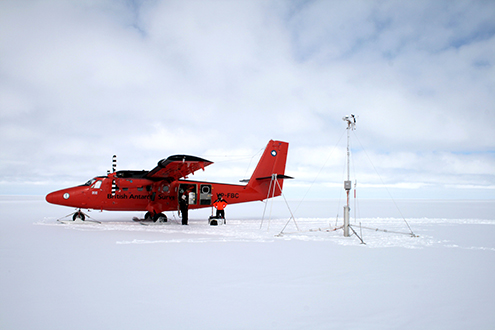Most people know about global warming and rising sea levels. However, only a small group of scientists and engineers understand the importance of monitoring them from space and continuing to perfect the technologies central to this process.
A handful of such experts gathered on October 17th for the TU Delft Climate Institute’s symposium “The Greenland and Antarctic ice sheets: present, future, and unknowns”, where they agreed that while the technology employed in mapping and monitoring ice sheets remotely is better than ever, its current limits must be addressed if we’re to gain a full understanding of ice sheets’ role in climate change.
Speaking to a full theatre at the Sports & Culture building, Assistant Professors Pavel Ditmar and Miren Vizcaino of the TU Delft, Professor Michiel van den Broeke of Utrecht University and Dr. Mark Drinkwater of the European Space Agency provided technical, detailed information about ice sheets. This included rate of melt, current technologies for measuring ice sheets from space and a recent breakthrough in including ice sheets in climate models.
The Gravity Recovery and Climate Experiment (GRACE), twin satellites that measure Earth’s gravity field in detail, and which can be used to weigh ice sheets, was central to the day’s talks and panel discussion. Participants cited GRACE’s central role in constraining on-going ice sheet loss in Greenland and Antarctica, and reviewed the progress made in monitoring various other aspects of ice sheets from space. Although GRACE and other remote-sensing tools have “come an extremely long way in the past 20 years”, Drinkwater said, in the next decade there “will be a revolution in climate and ice sheet modelling”. Perhaps signalling the beginning of this revolution, Vizcaino talked about the increasing use of ice sheets in developing climate models. She said that there has recently been much progress with atmosphere process models, which means more and better information in the years to come about ice sheet changes and their impact. “A perfect understanding of this process is very important”, said Ditmar, “because a difference of 10% has profound practical implications”.
Symposium attendee Pedro Inacio, a Ph.D. candidate in the Civil Engineering Faculty, echoed this view, adding that work related to projects such as GRACE is very important. The technologies involved are “progressing quickly”, he said, which will lead to better techniques to monitor ice sheets. Ironing out the current problems will help to figure out “how to manage the human race” in the face of global warming, he explained.



Comments are closed.